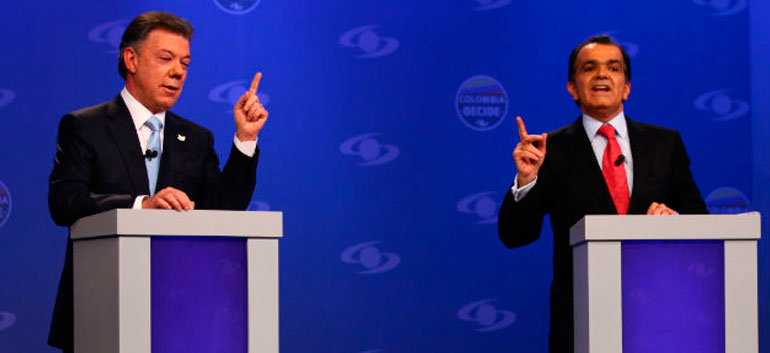Colombia’s presidential candidates engaged in a heated televised debate on Thursday night, nearly a week before the country’s second-round presidential elections on June 15,
Full election coverageCandidate profiles
1st Round Election ResultsElection polls |
The debate, hosted by Caracol TV, featured incumbent president Juan Manuel Santos, and his political rival and winner of the election’s first round, Oscar Ivan Zuluaga.
As expected, the main topic of contention was the ongoing peace negotiations between the Colombian government and the country’s largest rebel group, the FARC.
Santos’ primary criticism against Zuluaga was the latter’s public opposition to the peace negotiations, alleging that Zuluaga had spent the last four years criticizing the peace process.
“Zuluaga does not recognize the victims, and did not do so when he was Minister of Finance,” the president stated.
In recent weeks, Zuluaga has announced that if elected, he would put a temporary end to the controversial peace negotiations, at least until certain conditions were met. While the terms of the conditions are not yet clear, critics have said that the candidate’s hardline policies would most-likely undermine the future of the negotiations.
Santos vehemently defended his administration’s talks with the FARC, stating that he had made more progress towards peace in four years than was made during the last 46 years of armed conflict. The former defense minister also stated that his administration has provided more technological resources and manpower to improve Colombia’s security situation.
Santos also emphasized the military successes that he had achieved during his first term including killing of the first- and second-in-command of the FARC.
MORE: Colombia 2014 presidential election results (1st round)
Zuluaga tried to prevent Santos from taking complete ownership of the peace process. When Santos was defense minister, he stated, the incumbent was also against a Victim’s reparations law, adding that “peace does not belong to the President of the Republic.
Zuluaga cited the rebel group’s recruitment of child soldiers, use of anti-personnel mines, and attacks against key infrastructure, as justification for having more stringent conditions added to the peace negotiations.
MORE: Colombia govt, FARC to discuss victims in latest round of peace talks
The two candidates also sparred over economic and social policies, with Santos’ criticizing Zuluaga for having “regressive social policies.” The president stated that Colombia now has one of the strongest economies in Latin America, and is a leading example for regional security.
Zuluaga however cited Colombia’s high youth unemployment rates as evidence of Santos’ economic ineptitude, and attributed Colombia’s high investment rates to Santos’ predecessor and Zuluaga’s primary supporter, ex-president Alvaro Uribe.
MORE: Peace deal with FARC would mean end to Colombia’s obligatory military service: Santos
Colombia will host its second and final round of presidential elections on June 15, and either Oscar Ivan Zuluaga, candidate of former President Alvaro Uribe’s Democratic Center (Centro Democratico – CD) party, or incumbent President Juan Manuel Santos will be the next president of Colombia.
In the first round of elections on May 25, Zuluaga walked away with 29% of the vote while Santos who is seeking re-election gained nearly 25% of the vote.
The Colombian government and the FARC have already agreed upon three out of six points on the peace agenda. These include issues of agricultural development that are aimed at improving the quality of life for millions of farmers, agreements on political participation to strengthen democracy, and settlements on how to deal with illicit drugs.
Colombia’s chief negotiator in the peace talks announced on Tuesday that one of the most controversial topics, the issue of victims’ rights and reparations, will be at the center of the fourth round of negotiations.
The outcome of the elections will have serious implications for the future of the peace negotiations, as both candidates are strongly divided on the issue.




